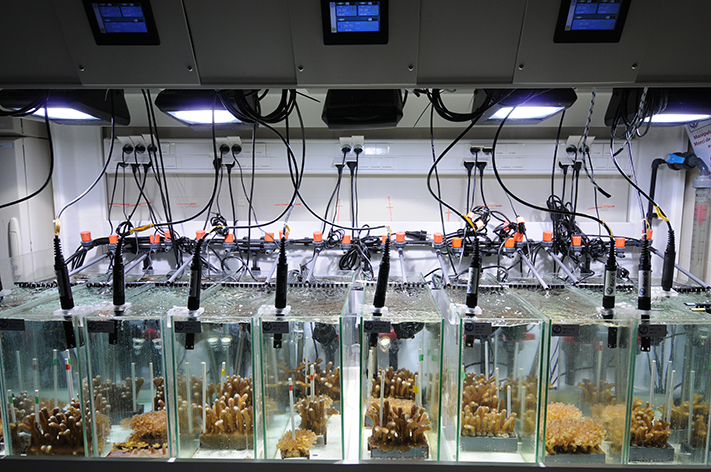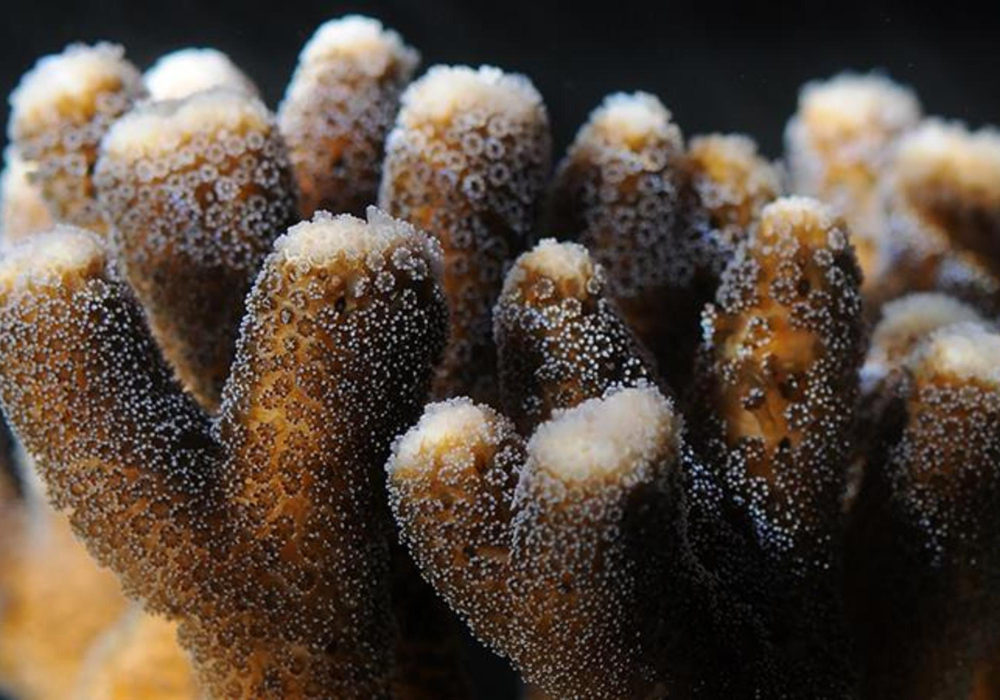“One of the most important things about corals isn’t that they’re beautiful—it’s the fact that they are essential in building ecosystems. They’re basically a foundation species,” said Manuel Aranda, KAUST assistant professor of marine science.
Aranda’s research focuses on the coral-algal symbiosis and the adaptive mechanisms inherent to reef-building corals. In particular, he examines how corals respond to environmental stressors by looking at questions such as: What are the factors that cause coral bleaching events and what adaptive potential do corals have to tackle the near future in terms of climate change?
There has been much media attention surrounding the recent mass coral bleaching event at Australia's Great Barrier Reef. A similar bleaching event was also observed in the Red Sea during the Northern Hemisphere summer of 2015. This past year was characterized as an El Niño year, describing a cyclical pattern of weather that leads to global changes in climate. Increasing temperatures due to climate change are the main drivers of the mass bleaching events.
Why do corals bleach?
When faced with a challenging environment, the corals' symbiotic algae start to produce reactive oxygen species that are harmful to the coral. The algae produce the highly reactive oxygen molecules as a consequence of sustained higher temperatures. In response, the coral expels the algae, thus essentially losing its main source of nutrition.
“One of the most important things about corals isn’t that they’re beautiful—it’s the fact that they are essential in building ecosystems. They’re basically a foundation species,” said Manuel Aranda, KAUST assistant professor of marine science.
Aranda’s research focuses on the coral-algal symbiosis and the adaptive mechanisms inherent to reef-building corals. In particular, he examines how corals respond to environmental stressors by looking at questions such as: What are the factors that cause coral bleaching events and what adaptive potential do corals have to tackle the near future in terms of climate change?
There has been much media attention surrounding the recent mass coral bleaching event at Australia's Great Barrier Reef. A similar bleaching event was also observed in the Red Sea during the Northern Hemisphere summer of 2015. This past year was characterized as an El Niño year, describing a cyclical pattern of weather that leads to global changes in climate. Increasing temperatures due to climate change are the main drivers of the mass bleaching events.
Why do corals bleach?
When faced with a challenging environment, the corals' symbiotic algae start to produce reactive oxygen species that are harmful to the coral. The algae produce the highly reactive oxygen molecules as a consequence of sustained higher temperatures. In response, the coral expels the algae, thus essentially losing its main source of nutrition.
Climate change and the epigenetics of corals from KAUST Video on Vimeo.
“It's been calculated that the algae provide up to 90% of the energetic needs of a coral,” Aranda explained. The corals actually mostly depend on energy from photosynthetic products produced by the algae, so, by expelling the algae, the corals are basically starving themselves.
The corals calculate they are better off removing the algae producing the toxic substance with the hope that environmental conditions will improve enough to eventually take back the algae. In the meantime, the corals cannot maintain all their normal processes, such as calcification. If the algae aren’t available again fast enough, the coral continues to starve and eventually dies.
The reason why the corals lose their characteristic bright colours and appear white, or bleached, is because the actual coral animal itself—the thin fleshy tissue layer known as a polyp responsible for kicking out the algae—becomes see-through. Without the algae the polyp typically feeds on, all that is visible is the white skeleton. When this happens, it’s a very clear sign of stress.
When the coral has lost its algae and the white skeleton is visible, a closer look at the reef can reveal that the animal, or polyp, is still there. It has simply lost the algal symbiont. If the stress goes away quickly enough to a level sufficient for the animal to recover, it will get the colourful algae back and the coral can go on living.
Epigenetics: How coral phenotypes change to survive
“Understanding the ability of these organisms to change their phenotype, an organism's observable characteristics or traits, to change or optimize what their actual genome allows them to do and to become could be very beneficial for us to help them slowly acclimate and maybe even adapt to future climate change scenarios,” Aranda noted.
Aranda’s group conducted experiments that demonstrated that corals are able to modify their genome on the epigenetic level (on the level of DNA methylation) to change the phenotype in a way that allows them to maintain their growth when faced with ocean acidification. The trade-off is that they’re not able to calcify at the same rate.
The Red Sea as a laboratory for coral worldwide
“The exact point at which corals bleach is a really critical question, especially as we're trying to predict how much stress reefs will be able to stand into the future,” said Michael Berumen, KAUST associate professor of marine science.
 Professor Aranda's team has been conducting controlled environment research over the past two years to examine the transgenerational aspect of coral adaptation to the combined stresses of temperature and ocean acidification.
Professor Aranda's team has been conducting controlled environment research over the past two years to examine the transgenerational aspect of coral adaptation to the combined stresses of temperature and ocean acidification.Sometimes a bleaching event can be triggered not by a particularly sharp rise in sea temperatures, but, for example, by a slightly higher temperature of 2 degrees above normal summer temperatures over a couple of weeks.
“This is why high levels of stress for a short period of time could actually be less harmful in the long run than lower levels of stress over a longer period of time because then the animal starves,” Berumen added.
In the case of the Red Sea, it’s evident that corals survive in a naturally more stressful state than their counterparts in Australia, for example.
“If you took a coral out of the Great Barrier Reef and you dropped it into the Red Sea, it would probably become stressed out and bleach very quickly because the normal conditions there are already a bit hotter,” said Aranda.
The Red Sea is also a bit saltier, so it has different conditions than most of the coral reef systems in the world.
“It's interesting to know that corals can generally adapt,” Aranda continued. “The problem is that adaptation is a process that takes a long time—it needs to gather a certain amount of beneficial mutations, and they might not have this time in the other oceans.”
Studying the underlying epigenetics behind this provides scientists from the KAUST Red Sea Research Center (RSRC) with some valuable insights into potentially trying to understand what characteristics the Red Sea corals possess (despite also being affected by global stressors) that allow them to withstand warmer temperatures and higher salinity levels. Is it something in their genomic architecture?
“The Red Sea is basically a laboratory right in front of our doorstep,” Aranda said.
These are indeed important questions to elucidate because scientists expect other reefs from around the world to experience these same conditions in the not too distant future.
Why coral reefs are important
“There are thousands and thousands of species that live on any given coral reef. At the heart of it all, coral is building the entire system. For some animals, corals are a direct source of food. For many animals, they're just a home, but they also provide the framework that all of these species live in. Losing corals and losing diversity in corals—losing the live corals—has really major knock-on effects with other species, with fish, with things like shrimps and crabs, for example. Corals sit at the base of the entire system. If it weren't for the corals, we wouldn't have a reef to begin with,” explained Berumen.
This article was first published on www.kaust.edu.sa




Comments powered by CComment